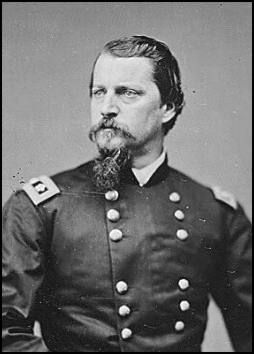
The Defenders
George Meade
After roughly two years of war, the Union had gone through its fair share of commanding generals. At the first battle of Bull Run, the Union was lead by John Pope, at Antietam by George McClellan, at Fredericksburg by Ambrose Burnside, at Chancellorsville by Joe Hooker, and finally, at Gettysburg by George G. Meade. All of Meade’s predecessors had done battle with Lee, and all of them, with the exception of McClellan, had been defeated by the Virginian. Now it was Meade’s turn. When Lee heard of Meade’s promotion, he knew that Meade would “commit no blunder,” but Lee also did not feel that Meade would be able to out maneuver him (Stewart, Pickett’s Charge, 6). Born in Cadiz Spain and raised in the Baltimore area, Meade was not expecting to be made the Army of the Potomac’s new General. Not long before he received word of his advancement Meade had written to his wife on, “the ridiculous appearance we present of changing our generals after each battle” (Foot, Stars in their Courses, 43). Meade was surprised when he was made General as there were a number of other men more qualified for the job, and that in his own words he had, “no friends, political or others, who press or advance my claims or pretensions.”(Foot, Stars in their Courses, 43) A few days later, Meade found himself at the reins of the Union’s most important war machine, the Army of the Potomac, and it stood in the way of the Confederacy’s most lethal. On the third day on the fields of Gettysburg, Mead found himself and many of his men firmly encamped on a series of hills and ridges on the outskirts of the town. Less the a mile away, Lee and Longstreet were amassing their men and guns, as Meade had done the same. Defending Cemetery ridge were three divisions of the Union army, arranged from north to south: Hays, Gibbon, and Doubleday. These three divisions were lead in the field by Winfield Scott Hancock.
Hancock
Hancock entered West Point at the age of sixteen, and was present there with many other notable Civil War names such as Burnside, Grant, and Hays who would serve under him during Pickett’s charge. Also like many of fellow officers, both friendly and foe, Hancock fought in the Mexican war in the late 1840s. By the end of the Peninsula campaign fourteen months prior to Gettysburg, General McClellan praised his efforts as “superb”, and his men along with many others took to calling him “Hancock the Superb”, a nickname one could imagine Winfield Scott was quite satisfied with.


This CC image from: http://trighloinedorcha.files.wordpress.com/2011/07/winfield-scott-hancock.jpg